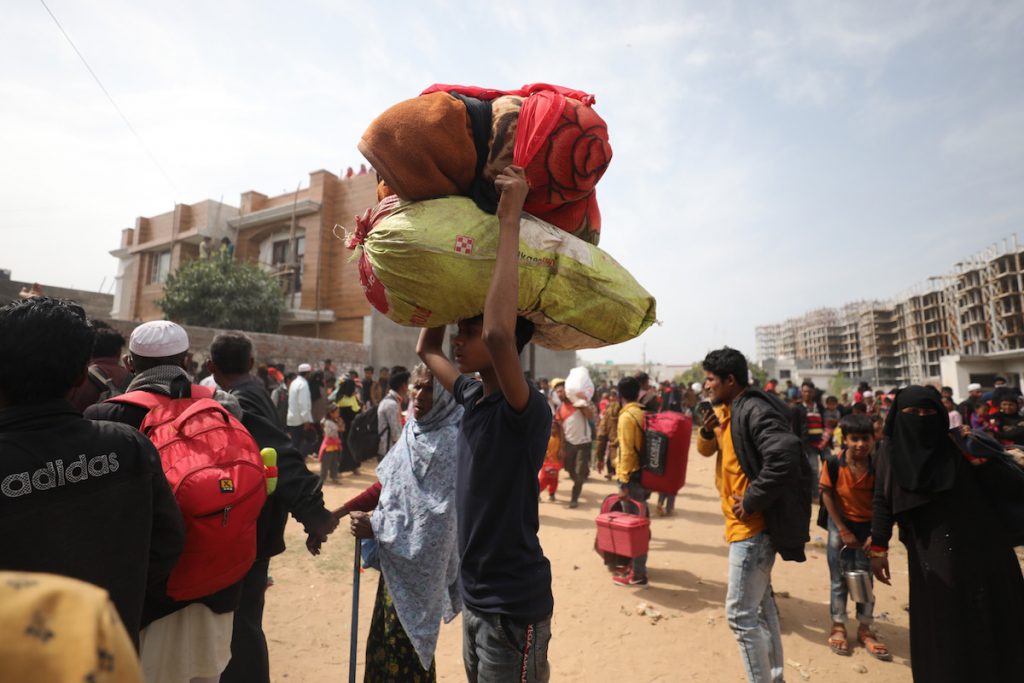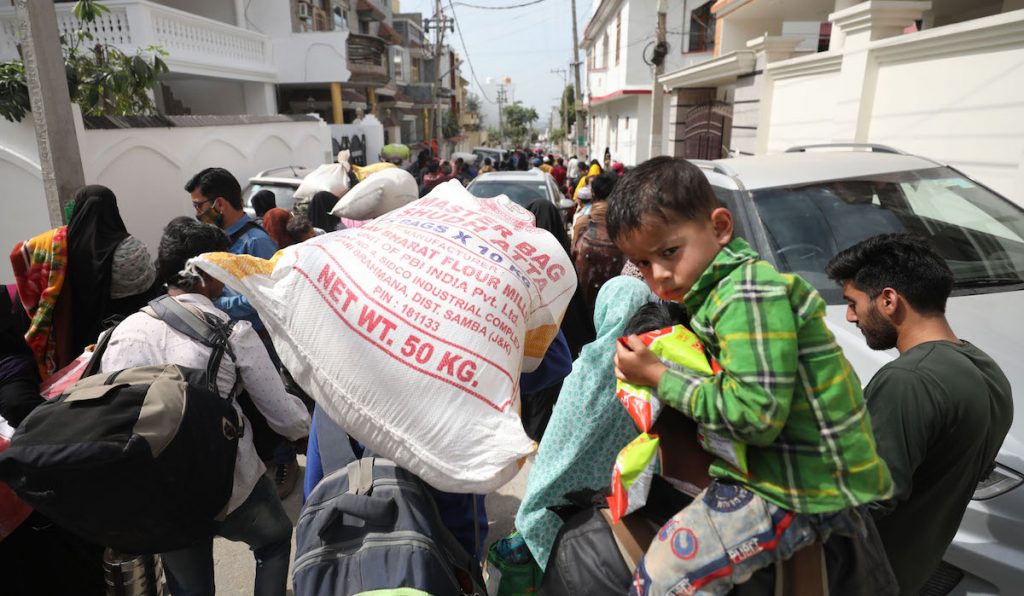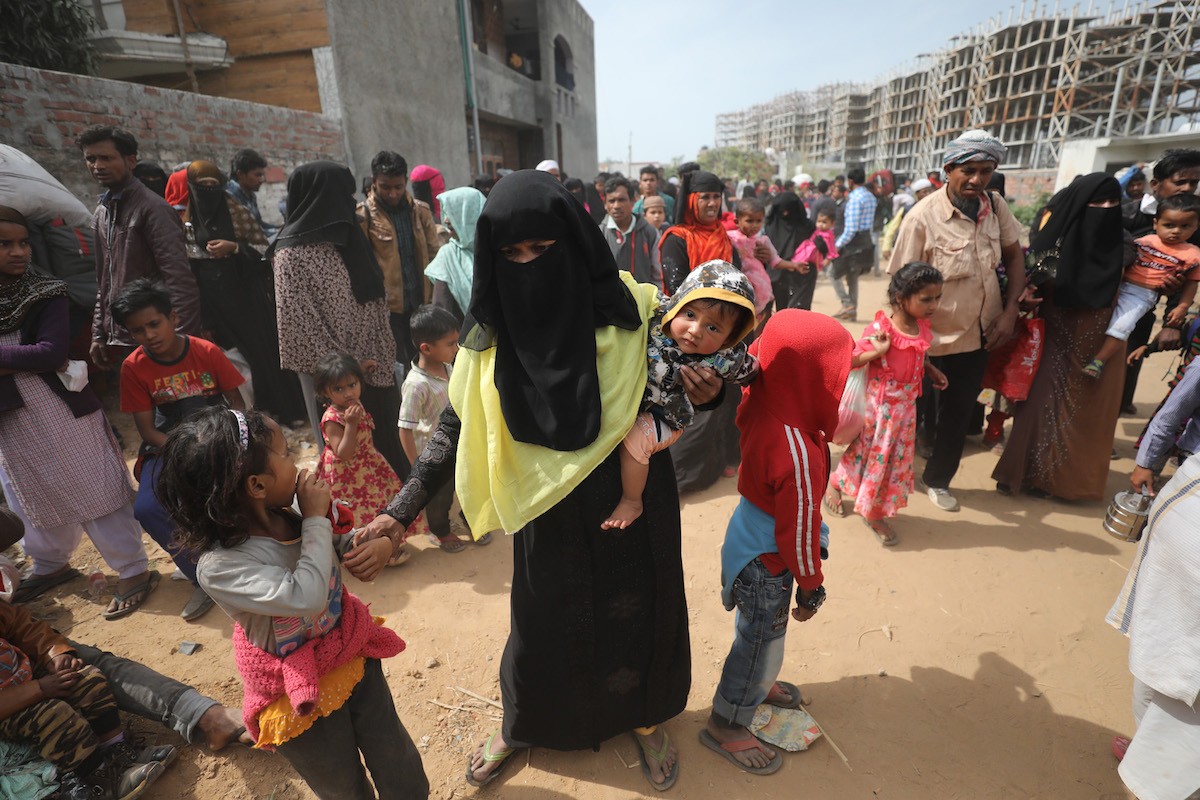The air is thick with anxiety in Bathandi camp situated in India’s northern Jammu city where the threat of deportation looms among the camp’s Rohingya refugees.
Already the government has bundled more than a 150 of them into the nearby Hira Nagar detention center from where they’re likely being sent back to Myanmar.
Over a million Rohingya have fled Myanmar, many in 2012, but most of them since August 2017 when the country’s military unleased what a UN fact-finding mission described as possible genocide.
Myanmar’s government refuses to accept them as citizens and considers them as illegal migrants from Bangladesh.
As part of the exodus, thousands of Rohingya have arrived in Jammu city where they built refugee camps on rented land, crammed with makeshift tenements in 22 locations across the city.
The government says there are 1,219 Rohingya families, comprising 5,107 members living in the Jammu region where some of them seek a living as laborers, roadside vendors and scarp collectors.
Last month, the government raided Rohingya settlements in the Jammu area and police took into custody more than 150 such refugees. According to the state authorities these Rohingya are living illegally in the region.
The action came after the pro-Hindu nationalist Bhartiya Janata Party (BJP), which runs the federal government, promised its voters that it will free India of Rohingya Muslims settlements and would send the Rohingya back to Myanmar.
As part of that the BJP has said India is not signatory to the specific UN Convention Relating to the Status of Refugees, nor the Protocol Relating to the Status of Refugees and as such is not obligated.
This understanding that they’re not welcomed by the Indian government sits heavy with those Rohingya outside the Hira Nagar detention center waiting to meet their detained family members.

Among them was 28-year-old Meena Begum. She had a child in her lap and another holding her hand as she anxiously waited at the detention center’s main door to meet her husband who has been held there for over two weeks.
“Seven days ago, I talked to him for a mere two minutes,” Meena told LiCAS.News. I am thankful to the jail authorities that they let me meet my husband, but I don’t know whether I will be allowed to meet him again,” she said.
“The children keep asking where their father is. They are missing him.”
She spoke of what occurred when her husband was detained and described how a contingent of police and civil authorities came to their hut and asked for the identification documents.
The family showed their identity cards first given to them by United Nations High Commissioner for Refugees (UNHCR) when they arrived in India back in 2012. “They threw the cards away and took my husband along. I kept asking them the reason, but they told me that he will be back in a while. Two weeks have passed, but he is still in jail,” Meena said.
Her husband Siraj Alam is a daily wage laborer who earns no more than 7,000 rupees ($100) a month. Their eldest son is about 4 years old while the younger one is two.
“We have no money in our home and all the stored food we had is exhausted,” Meena said.
“The local jail authorities are telling us that my husband will be deported back to Myanmar. What will I do here? Where will I go?” she asked.
“We have been separated from each other in a most sadistic manner by the government. If authorities want us to deport, let it deport us together. Don’t kill us in parts,” she said.
‘At least we were alive’
Sajra Begum is a 73-year-old Rohingya woman whose only son has been detained by the police and she is left without a penny in her hut.
“I swear by Allah, I haven’t eaten anything in the past two days. I have nothing at my home,” Sajra told LiCAS.news
“My son was detained 10 days ago and since then there is no news of him. They say he will be deported back to Myanmar. I don’t know what to do.”
It has been 10 years since the mother-son pair have lived in the Jammu region. Her son, Abdul Ali works in a snack shop and earns some 200 to 300 rupees a day ($2).
Suffering health problems, Sajra said it would be better for her to die than to see a situation like this.
“We came to India and left our homes back in Myanmar only to save our lives. We had no other intention to come to India,” Sajra said.
“We are here living a miserable life but till now at least we were alive. The government is now inventing new ways to kill us all one by one.”
Sajra’s husband died two years ago and was buried in a local graveyard.
All Sajra said she now wants is to be buried next to her husband.
“I won’t have much time left. Leave my son alone and don’t deport him till I die,” she said while crying.

Government wants to create fear
Mohammad Saleem is a Rohingya refugee and an Islamic cleric. His brother is also detained in the center.
Saleem told LiCAS.News that the government’s claim that those detained were living illegally in the country is farcical. He said that all Rohingya refugees possess a valid UNHCR card.
“But the government wants to create a fear psychosis. They are picking us one by one on one pretext or the other. The motive is to terrify us and legitimize our deportation,” Saleem said.
He said Rohingyas refugees in India have no intention to stay in the country permanently.
“But now, peace remains elusive in our country… Please let us live till things back home become normal,” Saleem told Licas.News.
A senior government official who did not want to be named because he was not authorized to speak on the issue, told LiCAS.News that the credentials of Rohingyas detained by the police are being verified.
He said the government is likely to take a final call about their deportation back to Myanmar — which is amid civil strife following a Feb. 1 military coup — in the near future.
“We had information that there were some Rohingyas living illegally in the region. The police scrutinized their details and now we are in the final phase of verifying their credentials. They will have to remain in detention centers for now,” the official said.







